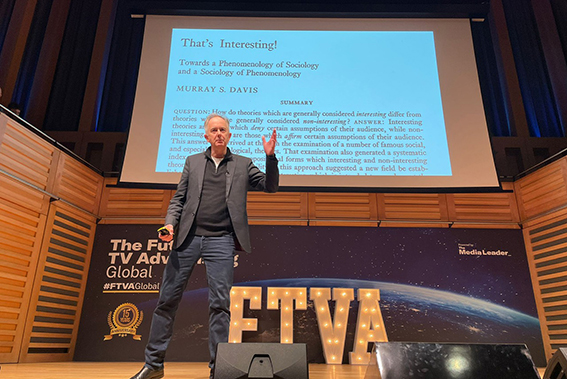Peter Field: It’s a ‘gross fallacy’ that startups don’t need brand-building ads

The Future of TV Advertising Global 2024
Startups need to create interesting, brand-building campaigns because dull ads will cost them £27m more to build awareness and £35m a year more to build trust.
These are just two notable figures highlighted by effectiveness expert Peter Field during his talk at The Future of Advertising Global on Tuesday.
As part of the ongoing The Cost of Dull project, Field wanted to show “what it costs when we don’t do” interesting work — “it’s the only way you’ll get a CFO to listen”, he joked to the audience.
Field used IPA DataBank figures on the top rational (what he labelled “dull”) and top “fame” (“interesting”) campaigns for his analysis.
Interesting work is defined as having sex appeal, is humorous and has dominant music tracks — all features that have a powerful impact on effectiveness. Meanwhile, the “classic” tools for dull campaigns are testimonials and a reliance on “authentic slice of life”.
Field’s analysis found that there’s a seven percentage point difference in share of voice between dull campaigns and interesting campaigns.
Role of TV in brand-building
A clear trend was that interesting campaigns have been allocating more budget to brand-building in the past four years, from 65% to 71% of total budget. Meanwhile, dull campaigns have done the opposite (from 47% to 44%).
Importantly, TV plays a crucial role here — Field found that “interesting campaigns have been rock steady in their commitment to TV”, while the share of TV budget in dull campaigns has been in decline over the past decade.
Amplified Intelligence founder Karen Nelson-Field, who is also contributing to the project, suggested that you cannot build brand awareness with two seconds of attention; you need 2.5 seconds or more. TV, meanwhile, commands 10-15 seconds of attention on average.
As Field said: “It’s a huge missed opportunity, particularly for the TV industry — you’re throwing away one of the greatest assets TV has as a media platform.”
Peter Field: ‘Any sensible marketer would be crazy to walk away from TV’
The performance ‘fallacy’
Field, who has previously criticised an overreliance on performance marketing as ineffective, said that dull campaigns were found to focus more on performance channels.
In particular, he suggested there is a tendency for startups to only invest in performance marketing because they don’t think they need brand-building — “one of the many gross fallacies”, Field argued, since this is only true for the first year.
According to his analysis, while in the first year a startup needs a brand-building versus performance investment ratio of 35:65, to become a market leader it needs the ratio to be 72:28. As he said: “TV often saves the necks of these companies.”
Here, again, being dull costs. Field pointed to two key metrics that startups need for success: building awareness and building trust. His calculations found that it would cost £27m a year more for a dull campaign to build awareness and £35m a year more to build trust.
Little dramas
So how to create interesting, brand-building work?
On stage with Field, Eatbigfish partner and author Adam Morgan (pictured, below) shared some ideas for brands.
Citing research from Murray S Davis in 1971 on social theories, Morgan said the solution is to “deny a key assumption of the audience”. Orange France’s Cannes Lion Grand Prix-winning “WoMen’s Football” campaign, which tricks the audience into thinking they’re watching the French men’s football team, is a case in point.
“We need to understand what the assumptions are and how we deny them,” Morgan explained.
He shared another lesson from a conversation with Norman Stiles, former head writer on Sesame Street. According to Stiles, successful “little dramas” require two ingredients: showing what your characters want and showing what gets in the way of that.
Using Back Market and Who Gives a Crap as examples, Morgan said that “successful brands understand both of those” and urged delegates to “think about this strategically”.
“The bar is not what other B2B ads are doing; the bar is entertainment,” he concluded.





